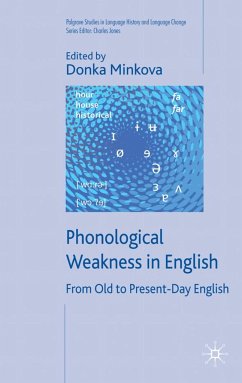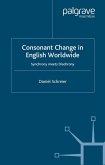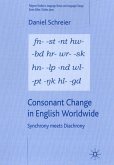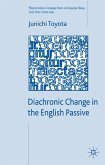Phonological Weakness in English
From Old to Present-Day English
Herausgegeben:Jones, C.; Loparo, Kenneth A.
Phonological Weakness in English
From Old to Present-Day English
Herausgegeben:Jones, C.; Loparo, Kenneth A.
- Gebundenes Buch
- Merkliste
- Auf die Merkliste
- Bewerten Bewerten
- Teilen
- Produkt teilen
- Produkterinnerung
- Produkterinnerung
A uniquely focused collection addressing the identification, functional properties, and broader consequences of phonological weakness over a broad chronological range, from Old to Present-Day English and its varieties, enriching the phonological literature with fresh empirical findings from a variety of sources.
Andere Kunden interessierten sich auch für
![Consonant Change in English Worldwide Consonant Change in English Worldwide]() D. SchreierConsonant Change in English Worldwide38,99 €
D. SchreierConsonant Change in English Worldwide38,99 €![Consonant Change in English Worldwide Consonant Change in English Worldwide]() D. SchreierConsonant Change in English Worldwide75,99 €
D. SchreierConsonant Change in English Worldwide75,99 €![Diachronic Change in the English Passive Diachronic Change in the English Passive]() J. ToyotaDiachronic Change in the English Passive38,99 €
J. ToyotaDiachronic Change in the English Passive38,99 €![Diachronic Change in the English Passive Diachronic Change in the English Passive]() J. ToyotaDiachronic Change in the English Passive38,99 €
J. ToyotaDiachronic Change in the English Passive38,99 €![Creating and Digitizing Language Corpora Creating and Digitizing Language Corpora]() Joan C. Beal / Karen P. Corrigan / Hermann L. Moisl (ed.)Creating and Digitizing Language Corpora75,99 €
Joan C. Beal / Karen P. Corrigan / Hermann L. Moisl (ed.)Creating and Digitizing Language Corpora75,99 €![Variation and Morphosyntactic Change in Greek Variation and Morphosyntactic Change in Greek]() P. PappasVariation and Morphosyntactic Change in Greek38,99 €
P. PappasVariation and Morphosyntactic Change in Greek38,99 €![Competing Patterns in English Affixation Competing Patterns in English Affixation]() Competing Patterns in English Affixation80,20 €
Competing Patterns in English Affixation80,20 €-
-
-
A uniquely focused collection addressing the identification, functional properties, and broader consequences of phonological weakness over a broad chronological range, from Old to Present-Day English and its varieties, enriching the phonological literature with fresh empirical findings from a variety of sources.
Produktdetails
- Produktdetails
- Palgrave Studies in Language History and Language Change
- Verlag: Palgrave Macmillan / Palgrave Macmillan UK / Springer Palgrave Macmillan
- Artikelnr. des Verlages: 978-0-230-52475-0
- 2009
- Seitenzahl: 357
- Erscheinungstermin: 18. Dezember 2009
- Englisch
- Abmessung: 222mm x 145mm x 30mm
- Gewicht: 576g
- ISBN-13: 9780230524750
- ISBN-10: 0230524753
- Artikelnr.: 25154286
- Herstellerkennzeichnung
- Libri GmbH
- Europaallee 1
- 36244 Bad Hersfeld
- gpsr@libri.de
- Palgrave Studies in Language History and Language Change
- Verlag: Palgrave Macmillan / Palgrave Macmillan UK / Springer Palgrave Macmillan
- Artikelnr. des Verlages: 978-0-230-52475-0
- 2009
- Seitenzahl: 357
- Erscheinungstermin: 18. Dezember 2009
- Englisch
- Abmessung: 222mm x 145mm x 30mm
- Gewicht: 576g
- ISBN-13: 9780230524750
- ISBN-10: 0230524753
- Artikelnr.: 25154286
- Herstellerkennzeichnung
- Libri GmbH
- Europaallee 1
- 36244 Bad Hersfeld
- gpsr@libri.de
PAOLA CRISMA, University of Trieste, Italy EDWARD FLEMMING, MIT, USA RAMOND HICKEY, Essen University MARGARET LAING, Institute for Historical Dialectology, University of Edinburgh, UK ROGER LASS is Professor Emeritus and Senior Professorial Fellow at University of Cape Town, South Africa LISA LAVOIE, Eliza Corporation and Emerson College APRIL McMAHON, Department of Linguistics and English Language, University of Edinburgh, UK JULIA SCHL?TER, University of Bamberg, Germany KIE ROSS ZURAW, University of California, Los Angeles, USA
Notes on Contributors Introduction: D.Minkova PART I: PHONETIC AND PHONOLOGICAL ASPECTS OF WEAKNESS Treatments of Weakness in Phonological Theory; K.R.Zuraw Testing Consonant Weakness Phonetically; L.Lavoie PART II: DIAGNOSING AND INTERPRETING ENGLISH SCHWA(S) On Schwa: Synchronic Prelude and Historical Fugue; R.Lass The Phonetics of Schwa Vowels; E.Flemming PART III: HISTORICAL AND DIALECTAL CASE STUDIES Perspectives on Weakness From English /r/; A.McMahon Weak Segments in Irish English; R.Hickey Word-Initial h- in Middle and Early Modern English; P.Crisma Consonant or 'Vowel'? A Diachronic Study of Initial h From Early Middle English to Nineteenth-Century English; J.Schlüter PART IV: PROSODIC AND MORPHOLOGICAL CORRELATES OF WEAKNESS Weak Segments and Syllable Structure in Middle English; J.Schlüter Orthographic Indications of Weakness in Early Middle English; M.Laing Inflectional Syncope vs Epenthesis: Notes on the History of the Weak Preterite in English; D.Minkova Index
Notes on Contributors Introduction: D.Minkova PART I: PHONETIC AND PHONOLOGICAL ASPECTS OF WEAKNESS Treatments of Weakness in Phonological Theory; K.R.Zuraw Testing Consonant Weakness Phonetically; L.Lavoie PART II: DIAGNOSING AND INTERPRETING ENGLISH SCHWA(S) On Schwa: Synchronic Prelude and Historical Fugue; R.Lass The Phonetics of Schwa Vowels; E.Flemming PART III: HISTORICAL AND DIALECTAL CASE STUDIES Perspectives on Weakness From English /r/; A.McMahon Weak Segments in Irish English; R.Hickey Word-Initial h- in Middle and Early Modern English; P.Crisma Consonant or 'Vowel'? A Diachronic Study of Initial h From Early Middle English to Nineteenth-Century English; J.Schlüter PART IV: PROSODIC AND MORPHOLOGICAL CORRELATES OF WEAKNESS Weak Segments and Syllable Structure in Middle English; J.Schlüter Orthographic Indications of Weakness in Early Middle English; M.Laing Inflectional Syncope vs Epenthesis: Notes on the History of the Weak Preterite in English; D.Minkova Index








